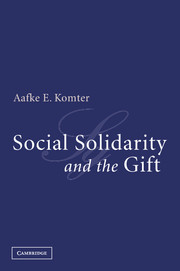7 - Family Solidarity
Published online by Cambridge University Press: 24 November 2009
Summary
Given rising divorce rates, it comes as no surprise that people are decreasingly happy with their marriages…. Given too, that pleasure in family life is the most important contribution to happiness and life satisfaction, here lies a major explanation of America's current and rising sorrow.
(Robert Lane 2000: 108)The worst tyrants among human beings … are jealous husbands …, resentful wives, [and] possessive parents … [in] a scene of hatred.
(Peter Laslett 1971: 4)In most Western countries children and the bonds between generations are still an important source of support for older generations, but concern for the continuity of this support is broadly felt. Over the past two centuries drastic changes have occurred in the nature and extent of family solidarity. Whereas in the absence of social security and institutions of social welfare kin served as the most essential resource for economic assistance and security, a gradual weakening of interdependence among kin has occurred over time. In the past commitment to the survival and economic well-being of the family took priority over individual needs. Also anthropological studies suggest that “kinship dues” were traditionally the main source of kinship support (Sahlins 1972). The instrumental orientation toward family has gradually been replaced by a more individualistic and affective orientation and a greater emphasis on individual needs and personal happiness (Hareven 1995). This development has raised a concern with the vitality of family bonds and intergenerational solidarity. Demographic changes have significantly added to this concern (Bengtson 2001).
- Type
- Chapter
- Information
- Social Solidarity and the Gift , pp. 144 - 166Publisher: Cambridge University PressPrint publication year: 2004

